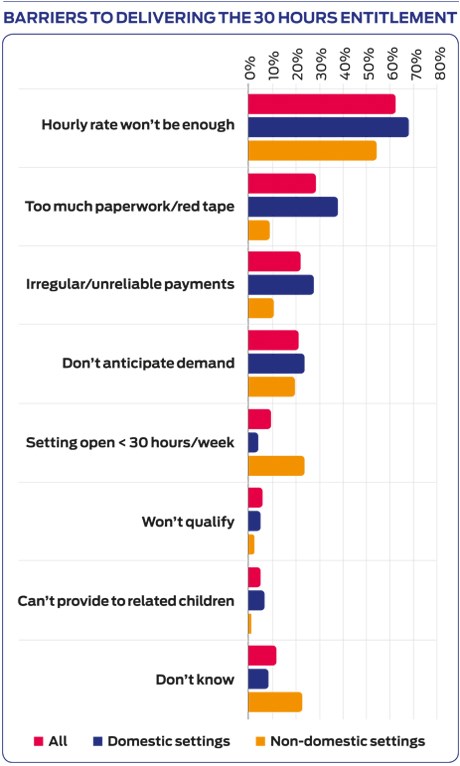Exclusive: PACEY Workforce survey finds childminders more confident than nurseries about the future
Monday, March 6, 2017
While many nurseries are losing confidence in their financial prospects, childminders appear to be feeling more optimistic.

Findings from PACEY’s second workforce survey, shared exclusively with Nursery World, show nursery staff are less confident about their setting’s future financial prospects than they were two years ago, but confidence among childminders has grown.
The first PACEY survey on the state of the early years and childcare sector in England was published in June 2015 ahead of details on the 30-hour plans.
The latest survey finds that settings planning to offer the 30 free hours for three- and four-year-olds are also more likely to say they are confident.
The survey was conducted ahead of the release of the publication of new early years funding rates from April.
A total of 1,888 childcare providers, including nurseries, pre-schools, childminders and nannies, across England responded to the survey, carried out between 19 September and 9 November 2016. The findings are published in a report, Building Blocks 2017.
The report reveals ‘stark divisions’ between the experiences of childminders and nurseries. It shows that while 71 per cent of childminders taking part in the survey made a profit in the past year, just 20 per cent of nurseries reported doing so.
Moreover, close to 40 per cent of nursery staff did not know whether or not they had made a profit. A total of 33 per cent of all respondents said they broke even.
The biggest increase in costs for all providers over the past 12 months was related to food, followed by training, insurance and staff costs.
Close to half of all respondents, the majority of whom worked in nurseries and pre-schools, said their setting was likely to raise its fees in the next 12 months.
Future plans
When asked how likely it was that their setting will grow in the next year, for example by increasing staff and/or taking on more children, just over half (52 per cent) said they had no plans to expand. However, over a third said growth was likely.
Respondents from nurseries and pre-schools were more likely to say they will grow their setting, as well as those planning to offer the 30 hours.
A total of 80 per cent, regardless of setting type, said they plan to still be working in childcare and early years in the next year; however, 15 per cent said they did not know. These figures are relatively unchanged from the 2015 survey.
The main reason for leaving the profession for childminders was a lack of demand for places/lack of work available, while for staff from nurseries and pre-schools the reason was inadequate pay.
30 hours
More than 45 per cent of nurseries and pre-schools and 35 per cent of childminders said their setting was likely to offer the 30 hours.
A low hourly rate was cited as a barrier, along with paperwork and red tape and unreliable local authority payments.
According to the report, just 1 per cent of three- and four-year-olds take up their current free early education place with a childminder.
When asked what would make settings more likely to deliver 30-hour places, for all settings the single biggest incentive given was a higher hourly rate.
An improved payment system, for example more regular and/or up-front payments, was also cited as an incentive.

Liz Bayram, chief executive of PACEY, urged childminders not to miss the opportunity of delivering the 30 hours, but said individuals should make an ‘informed choice’ about whether it would be worthwhile.
‘An important finding is that some childminders are thinking about offering the 30 hours. This is a community of people that so far have had little to do with the free entitlement,’ she said.
‘For some childminders the 30 hours will suit them, but for others it won’t. A lot of it is dependent on the level of funding in childminders’ areas, which will vary across the country.
‘PACEY wants to help childminders make informed choices about offering the 30 hours. It could be worth thinking about if childminders have unfilled places or if they have one- or two-year-olds in their care who will be eligible, as it could mean the children staying with them rather than leaving to go to nursery when they turn three.’
Qualifications
The Building Blocks survey also questioned providers on their qualifications and their thoughts on the current requirement to have GCSE maths and English. The Department for Education launched a three-week consultation on literacy and numeracy requirements for Level 3 staff last November.
The Government announced on Friday, that it was changing the rules in response to the sector's concerns and would reinstate functional skills for Level 3 Early Years Educators from 3 April, and also published the long-awaited Early Years Workforce Strategy (after our latest magazine issue went to press.)
The PACEY survey found that just under half (47 per cent) of respondents had a Level 3 or 4 qualification, while around a quarter (27 per cent) had a childcare or early years degree. Nearly a quarter had a non-childcare or non-early-years-related degree-level qualification.
Those working in nurseries and pre-schools were more likely to have a degree than childminders, as were those working in Ofsted-rated Outstanding settings.
Views were fairly evenly divided on whether learners should be required to have GCSEs in maths and English at grade C or above in order to gain a Level 3 Early Years Educator (EYE) qualification – a requirement since 2014 – with 44 per cent in favour and 48 per cent opposed. The remainder did not express a view. Childminders were more likely to be opposed to the GCSE requirement.
Recommendations
The Building Blocks report makes a number of recommendations to ensure that the free entitlement works for all providers:
- Government to set out in practical guidance what additional charges providers delivering the funded hours can pass on to parents.
- The rate paid to providers to deliver the free entitlement to be reviewed regularly, preferably on an annual basis, to ensure it is sustainable and accounts for providers’ changing costs.
- Prompt monthly payments for providers to be a statutory requirement.
- Childminders to be able to deliver the free entitlement to children related to them, as all other early years providers are able to do.
- To support childcare providers to sustain their businesses, the report recommends:
- a workforce development strategy to be published, which includes recognition of strengthened functional skills equivalents alongside GCSEs in maths and English to help alleviate the ‘looming early years recruitment crisis’, and help for more practitioners to gain a Level 3 EYE qualification
- the establishment of a sector-led task force to set out how to improve career pathways and specialisms within and beyond the sector
- steps for Early Years Teachers to take to gain Qualified Teacher Status so they have access to the same pay and conditions as the wider teaching profession.
PACEY also wants awareness of childminders raised among parents, and for local authorities to promote them and ensure they are well represented within their childcare offer.




